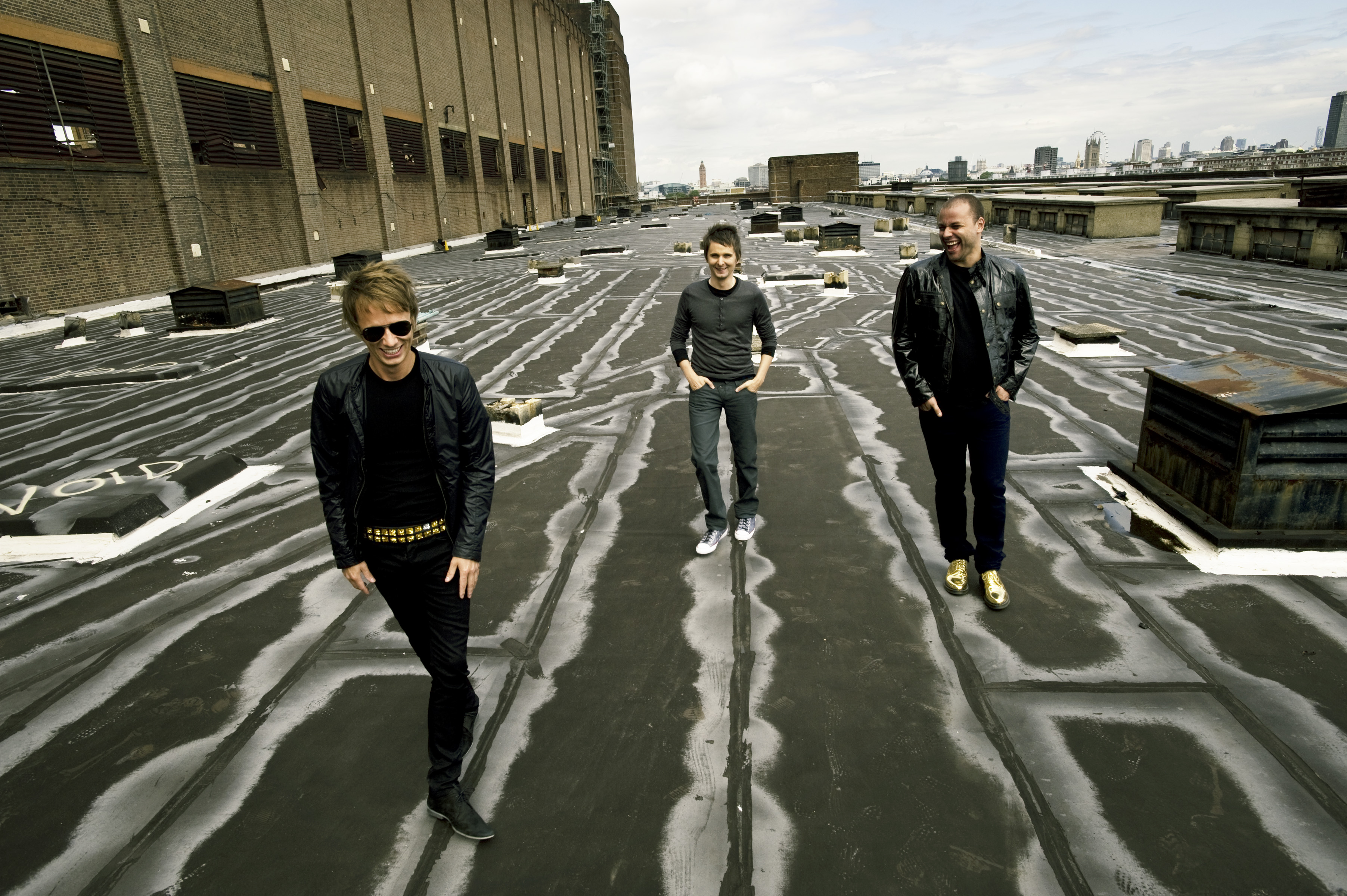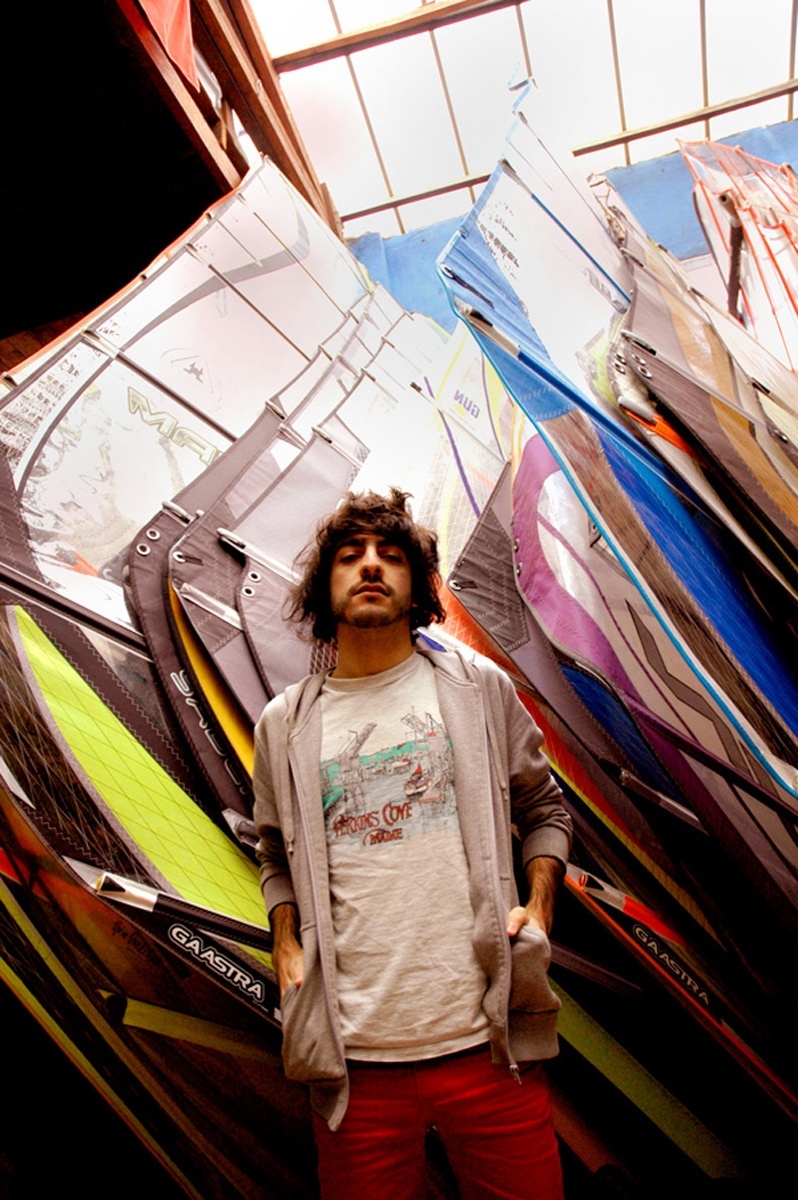The first performances of The Resistance Tour were support gigs with none other than U2, whom Wolstenholme describe as “probably
the most experienced stadium band in the world”.
Spaceships, purpose-built skyscrapers, lasers and rotating drum risers are just some of the trademark ‘props’ that render Muse’s stage production a truly confounding and unique spectacle. The British alt-rock trio have gone from playing small clubs to selling out arenas and now stadiums, while their fifth album – The Resistance – proved that few bands are capable of fusing unremitting ambition and anthemic grandeur with more aplomb and dexterity. But recently, family life has also become more joyous for bassist Chris Wolstenholme.
His wife, Kelly, gave birth to their fifth child, Buster, early last month. “It was a name that was floating around when our fourth child was born, but we didn’t quite have the guts to use it,” Wolstenholme chuckles. “It’s quite a crazy name – it kind of felt right for this child… the name just suits the face sometimes, you know.”
Wolstenholme’s decision to live in Dublin with his family this year revolved around one pivotal issue: airport convenience. The band’s hometown, Devon, is a three to four hour drive from the nearest airport. As the bulk of The Resistance Tour has comprised arena/stadium shows and European festivals, the band would often have four or five days off for every one or two gigs.
“If I had still lived in Devon, I probably would’ve had to spend those days off on tour,”
Wolstenholme considers. “Living in Dublin now, it’s very close to the airport, so it’s just enabled me to hop in and out, really, for the shows. It’s very rare that we do more than three weeks at a time without having at least a week off, so I think as long as you have certain rules in place and understand that it is important to have a personal life away from the band as well, then it’s very easy to structure things.”
The first performances of The Resistance Tour were support gigs with none other than U2, whom Wolstenholme describe as “probably the most experienced stadium band in the world”. A younger but experienced band themselves, Muse’s incredible arena production for The Resistance Tour has become a benchmark for live bands worldwide.
“It was something that we’d always dreamed about doing – that when we got into slightly bigger venues, it’d be great to go in with a big production,” Wolstenholme affirms. “We always felt that being a three-piece, we needed something else on stage to look at, really. And I guess in the early days, we didn’t really move around all that much either – I think the performance of the band wasn’t that strong. Whatever venue we’re in or whatever stage we’re playing on, we just wanna make it look as impressive as possible. We’ve never wanted to repeat ourselves.”
Over the past decade, Muse have proven that their epic propensity and tremendous ambitions are truly second to none. The trio’s emotionally-driven, angst-ridden alternative/progressive rock became more ambitious across Showbiz (1999), Origin Of Symmetry (2001) and Absolution (2003). Fans listened in awe as the intensely raw and darkly introspective sound that first captivated their loyal following became increasingly anthemic, atmospheric, and grandiose in its musical and thematic scope. In 2006, Black Holes & Revelations would redefine grandiosity and pomposity in modern rock; its sheer camp and unabashed inclination towards epic, towering anthems appealed to the masses and propelled them to their current position as one of the world’s biggest bands. However, The Resistance – as a whole – is not only the most consistent distillation of their great catalogue, but a powerful statement of assurance: Muse will remain as they are – ambitious, entertaining, grandiose and perplexing.
Does that level of ambition come from having no limitations as a band and as performers? “Yeah, I think so,” Wolstenholme ponders. “I quite often feel that when I listen to the radio, there’s a lot of bands that kind of stick to a very palatable formula, which works for some bands but I don’t think that would ever work for us. Because we like to experiment and it’s not always with the intention of it being a song; it’s for our own personal enjoyment.
“Even at a very young age – when we were 14 or 15 – some of the things that we used to jam in rehearsal were pretty out there and we always wanted to have that element to us where we could be ambitious with our instruments and the sounds that we were creating, but at the same time we wanted to have this element that it was still music that was listenable.
“You get some bands who are all about melody and nice chords and writing pop songs,” he continues, “which is great and that’s what successful music has been all about for the last 40 or 50 years. But for us, we always wanted to take it a little bit deeper where we could maybe do stuff that was overly ambitious, while retaining that element of melody; something that people can listen to and not forget.
“I think it’s very easy to go the other way as well – you see a lot of bands where it’s all about the instrumentation and it’s about how technical they are on their instruments, but sometimes you forget that there’s a song underneath as well and you forget that people need a good melody to sing along to. We’ve always tried to combine a little bit of both.”
Lest we forget, Muse brought their fifth album to a stunning finale with a three-part symphony – could it possibly get more surprising than Exogenesis on Muse’s sixth album? “Well I hope so,” Wolstenholme asserts. “That symphony was almost a little bit out of our league, really,” he chuckles, “in terms of being a rock band. It was very, very difficult to put together and the way Matt [Bellamy] wrote that song, it would’ve worked equally as well if it was a piece of classical music. And obviously we wanted to take something like that and somehow turn it into a song that could be played as a band.
“The way we recorded it was completely different to how we recorded anything else… when you set yourself a challenge – no matter how difficult it is – and you finally pull it off, and people listen to them and go ‘yeah, that’s great’, then I think they’re the songs that are the most rewarding, because you know you’ve had to push yourself as a musician to get it to where it was supposed to be. For me, they’re the ones that I feel great about, when people turn around and say ‘The symphony is the best song on the album’, because you know that you had to work your arse off for it to sound like that’,” he chortles.
“We’ve not worked on any new music yet but I know that when we get into the studio, that will be the aim,” he says of the need to surprise listeners. “For us, it’s always a case of ‘we don’t all know exactly what musical direction we’re going to take, but we always know that we want to do something new’. We want to make an album that’s different to our last one and we want to make an album that we feel is better. That ambition for the next album is the one thing that will never change. With each album, there’s always at least one or two songs that take it into a whole new realm.”
Wolstenholme states that the desire to return to the studio is always there despite the importance of their live performance. It’s simply a matter of giving new material the time and space that it deserves. “It’s difficult to play new songs in the set now, because as soon as you play them live, someone’s recorded them on their phone and it’s all over the internet,” he notes with a chuckle, “and I don’t think that’s the best way for people to hear a new song for the first time. We’ve been on tour since last September; we’ve never had a significant break really, so we wrap up in Australia and there’s a few little bits we may do next year. But whatever gigs we do next year will be very minimal.
“We’ll probably start writing the new album towards the end of next year,” Wolstenholme informs, “with a view to get it out in 2012. But I don’t feel there’s a rush for us to get a new album out; we’ve been on tour for a long time and I think it might be a good time for the band to take a break for a while and then do an album in our own time, and feel like we’re not rushed and feel like we can be creative.
“And we’re all talking about potentially moving back to London as well. So if we all live in London, that will be the first time we’ve lived in the same place for 12 years, which will be great for all of us… because then we can work from home, which is something we haven’t had the luxury of doing.”
MUSE bring their massive The Resistance Tour to Melbourne at Rod Laver Arena (with guests Biffy Clyro) on Tuesday December 14 (sold out) and Wednesday December 15 (tickets selling fast – get them from ticketek.com.au and 132 849). You can check out the winning Plug In Baby comp video entries at bigdayout.com as well. The Resistance is out now through Warner.







